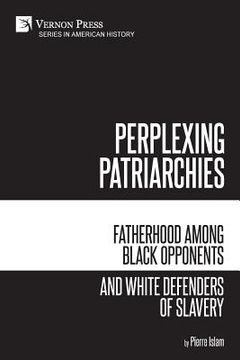Compartir
Perplexing Patriarchies: Fatherhood Among Black Opponents and White Defenders of Slavery (en Inglés)
Pierre Islam
(Autor)
·
Vernon Press
· Tapa Blanda
Perplexing Patriarchies: Fatherhood Among Black Opponents and White Defenders of Slavery (en Inglés) - Islam, Pierre
$ 1,391.42
$ 2,319.04
Ahorras: $ 927.62
Elige la lista en la que quieres agregar tu producto o crea una nueva lista
✓ Producto agregado correctamente a la lista de deseos.
Ir a Mis Listas
Origen: Estados Unidos
(Costos de importación incluídos en el precio)
Se enviará desde nuestra bodega entre el
Lunes 24 de Junio y el
Viernes 05 de Julio.
Lo recibirás en cualquier lugar de México entre 1 y 3 días hábiles luego del envío.
Reseña del libro "Perplexing Patriarchies: Fatherhood Among Black Opponents and White Defenders of Slavery (en Inglés)"
Perplexing Patriarchies examines the rhetorical usage (and lived experience) of fatherhood among three African American abolitionists and three of their white proslavery opponents in the United States during the nineteenth century. Both the prominent abolitionists (Frederick Douglass, Martin Delany, and Henry Garnet), as well as the prominent proslavery advocates (Henry Hammond, George Fitzhugh, and Richard Dabney), appealed to the popular image of the father, husband, and head of household in order to attack or justify slavery. How and why could these opposing individuals rely on appeals to the same ideal of fatherhood to come to completely different and opposing conclusions? This book strives to find the answer by first acknowledging that both the abolitionists and the proslavery men shared similar concerns about the contested status of fatherhood in the nineteenth century. However, due to subtle differences in their starting assumptions, and different choices of what parts of a father's responsibilities to emphasize, the black abolitionists conceived of an ideal father who protected the autonomy of his dependents, while the proslavery men conceived of one whose authority necessitated the subordination of those he protected. Finding that these differences arose from choices in starting assumptions and emphases rather than total disagreement on what the role of the father should be, this work reveals that black abolitionists were not radically critiquing the gender conventions of their day, but innovatively working within those conventions to turn them towards social reform. This discovery opens up a new way for historians to consider how oppressed peoples negotiated the intellectual boundaries of the societies which oppressed them: Not necessarily breaking entirely from those boundaries, nor passively accepting them, but ingeniously synthesizing a worldview from within their confines that still allowed for freedom and personal autonomy.
- 0% (0)
- 0% (0)
- 0% (0)
- 0% (0)
- 0% (0)
Todos los libros de nuestro catálogo son Originales.
El libro está escrito en Inglés.
La encuadernación de esta edición es Tapa Blanda.
✓ Producto agregado correctamente al carro, Ir a Pagar.

